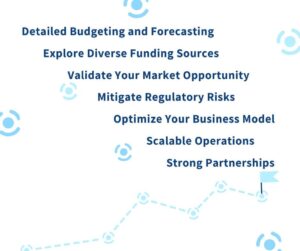Software and Biotech entrepreneurship offer dynamic opportunities for groundbreaking innovations that have the potential to make a significant impact on the world. However, moving the products from the concept stage in the lab to market fruition can be tricky and expensive. For entrepreneurs in these industries, knowing how to handle finances is key to turning their ideas into successful products. Let’s explore the important financial strategies for this journey, using recent real-life examples from within the United States.
Understanding Software and Biotech Financial Management Challenges
Startup companies in the software and biotech industries often incur high initial development costs, uncertain revenue streams, and intense competition. These startups must secure sufficient capital due to their lengthy product development process, as well as the realization timeline for their return on investment. Unlike businesses in other sectors, software and biotech companies may operate at a loss in the early years while focusing on testing and refining their products. Establishing a strong financial strategy and practicing prudent money management right from the beginning is essential for their success.
#1 Securing Initial Funding
The first big challenge for software and biotech startups is obtaining the money they need to start their business. This initial phase usually includes using personal savings (bootstrapping), applying for grants, and finding angel investors. A good example is Moderna Therapeutics which started with funding from Flagship Pioneering, a venture capital firm that invests in early-stage companies. This early funding was crucial for Moderna to develop its mRNA technology, which eventually became the key to creating its COVID-19 vaccine.
#2 Strategic Partnerships and Alliances
Establishing strategic partnerships can provide the essential financial and operational support needed to successfully launch the best innovations to the market. In April 2024, Cloud Software Group Inc. recently announced their 8-year strategic agreement with Microsoft Corp to develop joint cloud solutions and generative AI for more users.
As previously stated, Moderna is an example in its groundbreaking mRNA technology of vaccine development, which has attracted government partnerships. An article by Forbes that was published on May 30, 2024 states that Modrena will likely receive government funding for the last-stage trial of their Moderna mRNA Bird flu shot. According to the Financial Times, tens of millions of US dollars will come from the Biomedical Advanced Research and Development Authority (BARDA).
#3 Managing R&D Costs
Research and development (R&D) helps propel software and biotech innovations despite the significant resources it requires. While tech companies thrive on the principle of “innovate or perish“, it is important to manage R&D costs effectively to maintain steady progress with growth.
In March 2023, CRISPR Therapeutics, a leading gene editing company, announced its strategic partnership with Vertex Pharmaceuticals to help share costs and risks. The goal was to expedite the advancement of Vertex’s Hypo-immune Cell Therapies for effectively treating Type 1 Diabetes.
#4 Ensuring Regulatory Compliance
Regulatory compliance is a critical phase when bringing a biotech product to market. The U.S. Food and Drug Administration (FDA) maintains strict requirements for approval which can delay the development process and its return on investments.
An example is Biogen, a biotech company that faced many financial and regulatory obstacles while trying to bring its Alzheimer’s drug, Aduhelm, to market. Even though they had some setbacks and faced a lot of scrutiny, Biogen’s persistence and smart financial planning helped them finally get FDA approval, despite ongoing debates and challenges.
#5 Scaling Up and Manufacturing
Innovative medical advancements that reform healthcare have the potential to swiftly gain approval from regulatory authorities for their effectiveness and safety in widespread use. Companies face the huge challenge of securing financial backing for mass production in a short amount of time.
This scenario unfolded with Gilead Sciences and their revolutionary drug, Remdesivir, specifically designed to combat COVID-19. The drug was approved and the government purchased almost all the stock leaving Gilead with the challenge of rapidly scaling up production to meet urgent demand globally. Gilead ensured seamless production through voluntary licensing agreements to ensure adequate supply to hospitals and clinics, overcoming obstacles such as sourcing crucial ingredients, upholding stringent safety standards, and expediting delivery to reach those in need promptly.
Crafting a Solid Financial Roadmap
Drawing inspiration from these real-world case studies, software and biotech entrepreneurs must develop a comprehensive financial roadmap to help guide the journey of their innovations from lab to market.

Detailed Budgeting and Forecasting
- Plan for all stages of development, including potential delays and additional regulatory requirements.
- Anticipate any unexpected challenges, necessitating additional approvals from key decision-makers.
- Create a detailed budget and financial projections to accurately monitor expenses and revenue.
- Implement cost-saving strategies and carefully prioritize spending based on strategic goals. One cost-saving strategy could be outsourcing some business units to reduce the fixed costs of hiring in-house staff. Hiring a fractional CFO can help reduce the cost of a full-time accountant who might need to be paid regardless of downtime.
Explore Diverse Funding Sources
- Combine grants, angel investments, venture capital, and strategic partnerships to spread risk and secure necessary resources.
- Moderna effectively mitigated the financial uncertainties associated with early-stage research by diversifying its funding sources to lessen dependence on a single revenue stream.
Validate Your Market Opportunity
- Conduct market research to identify unmet needs and market trends and validate your product or technology through pilot programs, beta testing, and customer feedback.
Mitigate Regulatory Risks
- Invest in regulatory expertise to navigate the FDA process efficiently and to avoid costly delays.
- Identify potential risks and uncertainties, such as regulatory challenges, intellectual property disputes, and competitive threats.
Optimize Your Business Model
- Evaluate different revenue models, pricing strategies, and distribution channels to customize your business model based on market feedback and performance metrics.
Scalable Operations
- Develop dynamic operational procedures that enable seamless growth from small-scale to large-scale production. This tackles the obstacle Gilead Sciences encountered when transitioning from small-scale to full-scale production of their in-demand COVID-19 vaccine.
Strong Partnerships
- Form partnerships with established companies to share costs, risks, and expertise just like Cloud Software Group Inc. and Microsoft Corp in their 8-year agreement.
From securing initial funding to navigating regulatory hurdles and scaling up production, the financial roadmap for biotech entrepreneurs is complex but manageable with careful planning and strategic decision-making. Transitioning from the research lab and development process to the market can be a significant challenge for entrepreneurs in both industries.
However, with a well-thought-out financial plan and strategic execution, entrepreneurs can pave the way for success. Drawing insights from success stories like Moderna, CRISPR Therapeutics, and Cloud Inc., entrepreneurs can effectively navigate the challenges of securing funds, fine-tuning their business strategies, and managing risks to drive sustainable growth and make a lasting impact in their fields.
At Bright Balance, we specialize in providing the financial expertise and support so that Software and Biotech entrepreneurs can save their operational costs. Fractional accounting and finance services help start-ups with access to expert financial support at lower costs compared to hiring full-time accountants.
Our services in the Software and Biotech industries encompass transaction processing, augmented CFO, and FP&A support. Let us help you chart a course from lab to market, ensuring your innovative solutions can help the people who need them most.
Contact our Dallas office for a complimentary CFO consultation to explore the benefits of Fractional Accounting with Bright Balance today!
info@brightbal.com
www.brightbal.com
Dallas Office Phone Number: (214) 305-6094






